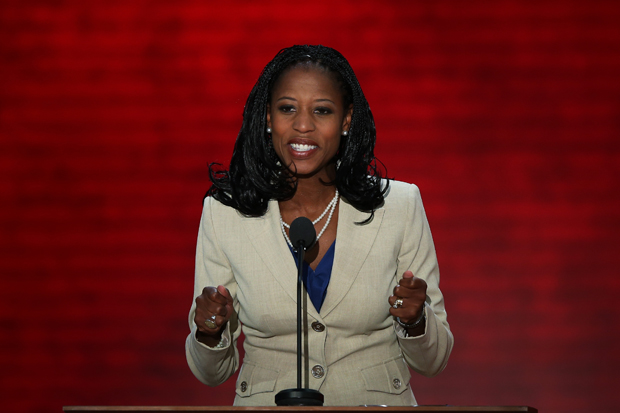Washington DC
Listen
Amid all the commentary about the Republican party’s triumph in America’s midterm elections, a remarkable fact was ignored: in style and substance, the American right is rapidly becoming a lot more like Britain’s. And that might be the key to its success.
In the last generation, American right-wingers have stood proudly apart from their counterparts in Europe, Britain, Canada and Australia. They were more religious, and more supportive of mass immigration. But that is changing.
Exhibit A is the dwindling influence of the religious right in the US. Its power peaked in the late 1980s, when Protestant evangelical pastors like the Reverends Jerry Falwell and Pat Robertson were power-brokers in the Republican party; the latter even ran in the 1988 Republican presidential primary. In recent memory, conservative politicians were compelled to talk about the importance of God and Jesus to their personal lives and their political views in ways which would be unthinkable on the part of conservative politicians in other western democracies.
But the religious right is a casualty of the increasing trend toward European levels of secularism and liberalism in matters of sex and reproduction. Americans still remain more religious than Europeans — but American society is converging into Europe’s post-Christian pattern. A vague belief in a God of some sort remains widespread, but organised religion in the US is haemorrhaging members to the ‘unchurched’ — a group of unaffiliated individuals which, if it were a denomination, would be the fastest-growing in America. The trend is most pronounced among younger Americans under 30, one third of whom have no religious affiliation, compared to one fifth of the population as a whole.
The gradual but steady decline in religious affiliation in America has been accompanied by increasingly permissive attitudes to extramarital sex and homosexuality. In America, as in Britain, these trends are most pronounced among the young. Nearly three out of four young millennials support same-sex marriage, for example, and are less concerned about unmarried parents than their elders. It may be a while before an American conservative leader welcomes gay marriage, as David Cameron has done. But the Republican establishment has gone from opportunistically supporting state-level bans against gay marriage a decade ago, in the hope of political gain, to fearing that opposition may hurt them more than it helps.
The American right is also coming to resemble the British right in the growing hostility towards the idea of amnesty for illegal immigrants, and to mass immigration in general. In the late 20th century, opponents of mass immigration like Patrick Buchanan were marginalised. The mainstream conservative movement, like the business community, supported President Ronald Reagan’s amnesty for millions of mostly Latin American illegal immigrants. The late editor of the Wall Street Journal, Robert Bartley, declared his support for a constitutional amendment with five words: ‘There shall be open borders.’
But within a decade, anti-immigration sentiment has moved from the fringes to the centre of Republican conservatism. The US is now replicating a pattern that can be seen in Britain, in which a resurgent populist and nationalist Ukip seeks to restrict immigration in the interest of protecting native wages and cultures. We can also see a strange-bedfellows alliance of employer interests, intellectuals, and left-liberals who seek to maintain or expand immigration, partly to counteract their loss of native white working-class voters.
In fact the Tea Party activist movement, who were widely described as libertarians, look increasingly like an American version of Ukip — but without a Nigel Farage. In June Eric Cantor, a House Republican whip widely viewed as a potential Speaker of the House, lost the Republican primary for his congressional seat from Virginia to an unknown professor, Dave Brat. A libertarian on many other issues, Brat won his surprise victory in part by denouncing Cantor for supporting amnesty for illegal immigrant children and illegal immigrants in the military.
The changing American right faced a test in the midterm elections this month — and passed it with flying colours. In earlier electoral cycles, Republican strategists blamed the loss of some seemingly winnable congressional and Senate seats on weak candidates associated with the declining religious right. In 2012, for example, the Republican Richard Mourdock, an evangelical Protestant candidate for one of the two US Senate seats from the state of Indiana, described pregnancies caused by rape as a ‘gift from God’ — a remark that helped his Democratic rival, Joe Donnelly, win the contest in an upset.
This year, however, the Republicans went to considerable lengths to present themselves as diverse and modern, just as David Cameron’s Conservatives did in opposition. This year’s Republican intake included Elise Stefanik, the youngest woman ever elected to Congress and Mia Love, the party’s first black congresswoman. The Republican candidate for the open US Senate seat from Colorado, Cory Gardner, distanced himself from his earlier support for anti-abortion measures — and publicised his support for over-the-counter ‘morning after’ contraceptives. He duly went on to defeat his Democratic opponent, Senator Mark Udall, whose unsuccessful attempt to portray Gardner as part of a Republican ‘war on women’ led opponents to mock him as ‘Uterus’ Udall.
By projecting a more moderate image, the Republicans helped turn a predictable midterm setback for a sitting Democratic president into a rout. Before the election in 2010, Obama had a Senate majority of 60 out of 100 and a House majority of 256 out of 435. Following the 2014 midterm election, Democrats have been reduced to a minority of 45 in the Senate and 192 in the House. To compound the damage, the Republican party will have complete control of 29 legislatures, the largest number since 1928, and will also hold 32 of 50 governorships, including some in traditionally Democratic states like Massachusetts and Maryland.
These victories were not prevented by Latino resentment of the Republican Party’s restrictionist turn in immigration — mainly because Latinos accounted for only 8 per cent of the vote in 2014, while non-Hispanic whites made up 75 per cent of the voters. Latino voters moreover are concentrated in a few states, such as California and Texas. The midterm electorate is older and whiter than the electorate in presidential years, with its greater turnout. Over time Republicans will have to win over more Latinos, if not blacks. But the Republican candidate for governor of Texas, Greg Abbott, won with 44 per cent of the Texas Latino vote, indicating that, unlike African–Americans, Latinos cannot be counted on as a reliable Democratic voting bloc.
The gradual evolution of the Republicans into a British-style socially moderate, anti-immigration party of the native white working class may force the Democrats to change as well. Without shared fear of the religious right to hold them together, Wall Street-friendly neoliberal ‘New Democrats’ have little in common with the banker-bashing populist left. If national populists challenge those in favour of free trade and open borders for labour, America’s political future may resemble Britain’s present.
Got something to add? Join the discussion and comment below.
Get 10 issues for just $10
Subscribe to The Spectator Australia today for the next 10 magazine issues, plus full online access, for just $10.
Michael Lind is a fellow at the New America Foundation and author of Land of Promise: An Economic History of the United States.
You might disagree with half of it, but you’ll enjoy reading all of it. Try your first month for free, then just $2 a week for the remainder of your first year.














Comments
Don't miss out
Join the conversation with other Spectator Australia readers. Subscribe to leave a comment.
SUBSCRIBEAlready a subscriber? Log in